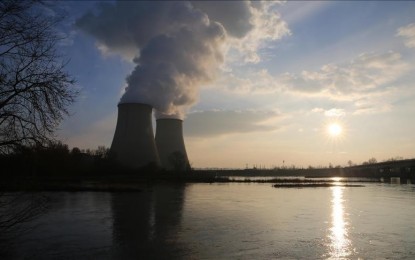
ANKARA – Facing a spiraling energy crisis, European governments are coming up with measures to rein in runaway bills and give some relief to worried citizens.
There were several new plans put forward across the continent on Tuesday, indicating the extent of the apprehension gripping Europe as it braces for what many are warning will be a tough winter.
To help drive down soaring energy prices, the EU on Tuesday said it would enable energy companies to set up consortiums for gas purchases.
“We know that Europe's energy demand is very large. So, it is logical that instead of outbidding each other, the member states and the energy companies should leverage their joint purchasing power, and for that we propose today legal tools for pooling energy demand at European level,” Ursula von der Leyen, European Commission president, told a press conference outlining a package of new measures to address high energy prices and ensure the security of supplies.
“We're also enabling energy companies to set up a gas purchase consortium so that they are together able to purchase gas,” she said, adding that the aggregation of demand will be mandatory for at least 15 percent of the volume needed to fill this storage.
Last year, she said, European energy companies were outbidding each other on the spot market and “driving the crisis up.”
Von der Leyen said solidarity is crucial in order for EU countries to be prepared “in case of a full gas and electricity disruption.”
France
Any illuminated or digital illuminated advertising must be turned off in France "in the event of a threat to the security of electricity supply," according to a decree issued by the Ecological Transition Ministry.
This came as part of efforts to conserve energy amid fears of supply shortages.
A previous decree, published in early October, provided for a blanket nighttime ban on illuminated advertising between 1 a.m. and 6 a.m., with the exception of airports, train stations or subway stops, even if there are no voltages in the power supply network.
The latest measure affects all advertisements, including at airports, train stations, and public transport stops, but without "jeopardizing the objectives of public safety, national defense and the safety of sensitive installations and structures," according to the new decree.
It also covers indoor advertising if it is "visible from the public street."
Germany
Germany’s famous “Cologne Lights” fireworks festival will not be held next year due to the ongoing energy crisis, organizers announced on Tuesday.
The annual musical fireworks display, which was scheduled to take place on July 15, 2023, was canceled as it became impossible to manage the costs, organizers said in a statement.
“Hardly predictable price developments and drastically increased personnel costs make reliable planning impossible, this brings incalculable risks for us,” organizers said.
“Cologne Lights” is one of the largest fireworks displays in the country, attracting nearly 800,000 visitors every year to the banks of the Rhine River to watch the spectacle.
Germany is facing the biggest energy crisis ever due to the ongoing Russia-Ukraine war, which led to disruptions in the oil and gas supply and pushed energy prices to record highs.
UK
Households in Britain may see blackouts and gas outages in the coming winter between 4 p.m. and 7:00 p.m. amid an ongoing energy crisis, the head of the National Grid warned.
John Pettigrew said electricity and gas may be switched off on "those deepest, darkest evenings in January and February" if energy supplies suffer due to the war in Ukraine.
Speaking at the Financial Times's Energy Transition Summit on Monday, Pettigrew said the National Grid had not changed its "base case" that there would be sufficient gas and power to meet demand in Britain this winter.
However, he said the blackouts could occur if temperatures drop particularly low in a worst-case scenario.
"In the context of the terrible things that are going on in Ukraine and the consequences of that, right that we set out what some of the potential risks could be."
The National Grid earlier this month said it was "unlikely" that Britain would run low on supplies.
Britain gets 40 percent of its electricity from gas-fired power stations, with gas also heating the majority of homes, according to a report by Sky News. (Anadolu)
